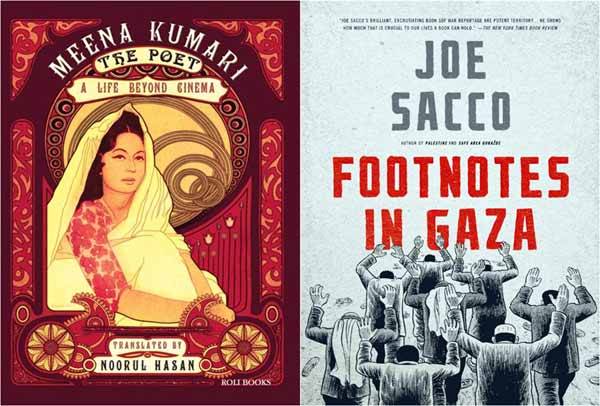
Biryani
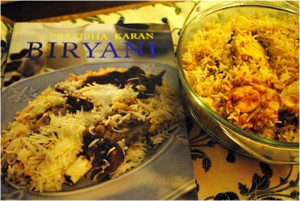
Pratibha Karan
Random House [hardback], 2009
PRs 1,995
The biryani is Pakistan and India’s most beloved dish, one that has spread to all four corners of the Subcontinent and assumed many forms. It originated in the Mughal courts, flowering in the jagirs of Awadh, and it is in Lucknow, Delhi and the small Muslim principalities of north India that one finds the classic versions, subtle, refined, and delicately flavoured. Pratibha Karan gives us not just the definitive recipes from these regions, but also unearths rare and old dishes such as a biryani made with oranges, rose biryani and kebab biryani.
In the south, the biryani has an equally distinguished lineage, if not more so. There are the blue-blooded biryanis of Hyderabad, which include gems such as the doodh (milk) ki biryani, keeme (mince) ki biryani and bater (quail) ki biryani. Away from the royal courts, the biryani has adapted itself into a spicy local delicacy in Tamil Nadu, with many towns like Salem, Aambur, and Dindigul boasting their own signature version of the dish. Kerala too is home to many versions: a prawn biryani spiced with curry leaves and aniseed, and a mutton biryani laced with star anise. There are as many stunning variations in the east and west: Goan biryanis using vinegar and olives, unusual dishes from the Parsi and Sindhi communities, Bengali adaptations using fish and mustard seeds, even a dish from Assam! Immaculately researched, full of extraordinary recipes, and beautifully designed and photographed, Biryani is the ultimate book on this princely dish.
What people are saying: “The sheer scope of the book is awe inspiring – so many biryani and pulao recipes in one place? Brilliant! There are dishes in here that I’ve only heard of and never tasted or found the recipes for” (Chef at Large www.chefatlarge.in).
The Last King in India: Wajid Ali Shah
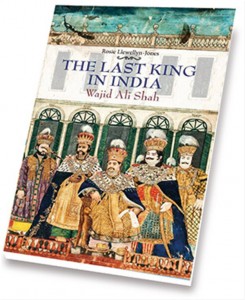
Rosie Llewellyn-Jones
Random House [hardback], 2014
PRs 1,095
The Last King in India is the story of an extraordinary man whose memory still divides opinion sharply today. Was he, as the British described him, a debauched ruler who spent his time with “fiddlers, eunuchs and women” instead of running the kingdom? Or, as most Indians believe, a gifted poet whose works are still quoted today and who was robbed of his throne by the East India Company?
Somewhere between the two extremes lies a complex character, a man who married over 350 women, who directed theatrical events lasting a month and who built a fairytale palace in Lucknow. Wajid Ali Shah was written out of the history books after his kingdom was annexed in 1856. Some even thought he had been killed during the mutiny the following year. But he lived on in Calcutta where he spent the last 30 years of his life trying to recreate his lost paradise. He remained a constant problem for the government of India, with his extravagance, his menagerie and his wives – in that order. For the first time, his story is told here using original documents from Indian and British archives and meetings with his descendants.
What people are saying: “Rosie Llewellyn-Jones, the greatest living authority on Nawabi Lucknow, has written a wonderful appreciation of the most under-appreciated of its Nawabs. She shows how Wajd Ali Shah should be remembered as one of the most important cultural catalysts of his day, and brings back to life the memorable last days of the great city whose ebullient creativity he represented” (William Dalrymple, author of The Last Mughal).
The Upstairs Wife: An Intimate History of Pakistan
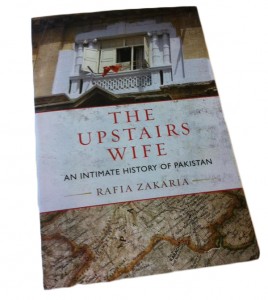
Rafia Zakaria
Beacon Press [paperback], 2015
PRs 1,195
For a brief moment on 27 December 2007, life came to a standstill in Pakistan. Benazir Bhutto, the country’s former prime minister and the first woman ever to lead a Muslim country, had been assassinated at a political rally just outside Islamabad. Back in Karachi – Bhutto’s birthplace and Pakistan’s other great metropolis – Rafia Zakaria’s family was suffering through a crisis of its own: her Uncle Sohail, the man who had brought shame upon the family, was near death. In that moment these twin catastrophes – one political and public, the other secret and intensely personal – briefly converged.
Zakaria uses that moment to begin her intimate exploration of the country of her birth. Her Muslim-Indian family immigrated to Pakistan from Bombay in 1962, escaping the precarious state in which the Muslim population in India found itself following the Partition. For them, Pakistan represented enormous promise. And for some time, the family prospered, as did the city. But in the 1980s, Pakistan’s military dictators began an Islamization campaign designed to legitimate their rule: a campaign that particularly affected women’s freedom and safety. The political became personal when her aunt Amina’s husband, Sohail, did the unthinkable and took a second wife – a humiliating and painful betrayal of kin and custom that shook the foundation of Zakaria’s family, but was permitted under the country’s new laws. The young Rafia grows up in the shadow of Amina’s shame and fury, while the world outside her home turns ever more chaotic and violent as the opportunities available to post-Partition immigrants are dramatically curtailed and terrorism sows its seeds in Karachi.
Telling the parallel stories of Amina’s polygamous marriage and Pakistan’s hopes and betrayals, The Upstairs Wife is an intimate exploration of the disjunction between exalted dreams and complicated realities.
Meera Kumari the Poet: A Life Beyond Cinema
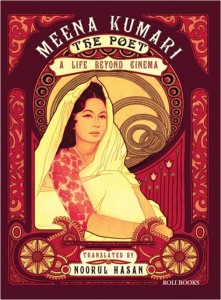
Transl. Noorul Hasan
Roli Books [paperback], 2014
PRs 695
Meena Kumari was not only an iconic star of Hindi cinema, but she was also a poet of great flair and delicacy. This book contains a compelling selection of her poems in the original Urdu and in brilliant English translations by Noorul Hasan. Haunting, crystalline and precisely observed, Kumari’s poetry reveals a side of her personality that was rarely on display in her films. It proves beyond any doubt that she was a far more sensitive and self-aware woman than her fans tend to realize. With a selection of critical and biographical material on the actress, including a concise introductory essay in which Daisy Hasan and Philip Bounds argue that much of Kumari’s poetry can be read as a barbed critique of Indian popular culture, this book is essential reading for her many admirers.
From the book: “When I took her leave, she came to the door to see me off. Stopping at the door she said, ‘When you write down this interview, add an aside of your own.’
‘What’s that?’ I asked.
She thought for a moment and said, ‘Meena Kumari’s life was other people’s destination. For her own self, it was a road leading nowhere’.”
Footnotes in Gaza
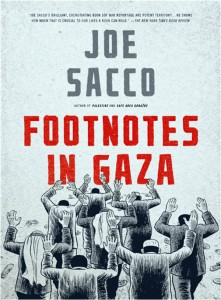
Joe Sacco
Jonathan Cape [hardback], 2009
PRs 1,245
From the great cartoonist-reporter, Joe Sacco, a sweeping, original investigation of a forgotten crime in the most vexed of places. Rafah, a town at the bottommost tip of the Gaza Strip, is a squalid place. Raw concrete buildings front trash-strewn alleys. The narrow streets are crowded with young children and unemployed men. On the border with Egypt, swaths of Rafah have been bulldozed to rubble. Rafah is today and has always been a notorious flashpoint in this bitterest of conflicts.
Buried deep in the archives is one bloody incident in 1956 that left 111 Palestinians dead, shot by Israeli soldiers. Seemingly a footnote to a long history of killing, that day in Rafah – cold-blooded massacre or dreadful mistake – reveals the competing truths that have come to define an intractable war. In a quest to get to the heart of what happened, Sacco immerses himself in daily life of Rafah and the neighboring town of Khan Younis, uncovering Gaza past and present. Spanning 50 years, moving fluidly between one war and the next, alive with the voices of fugitives and schoolchildren, widows and sheikhs, Footnotes in Gaza captures the essence of a tragedy.
What people are saying: “Sacco brings the conflict down to the most human level, allowing us to imagine our way inside it, to make the desperation he discovers, in some small way, our own” (Los Angeles Times).

